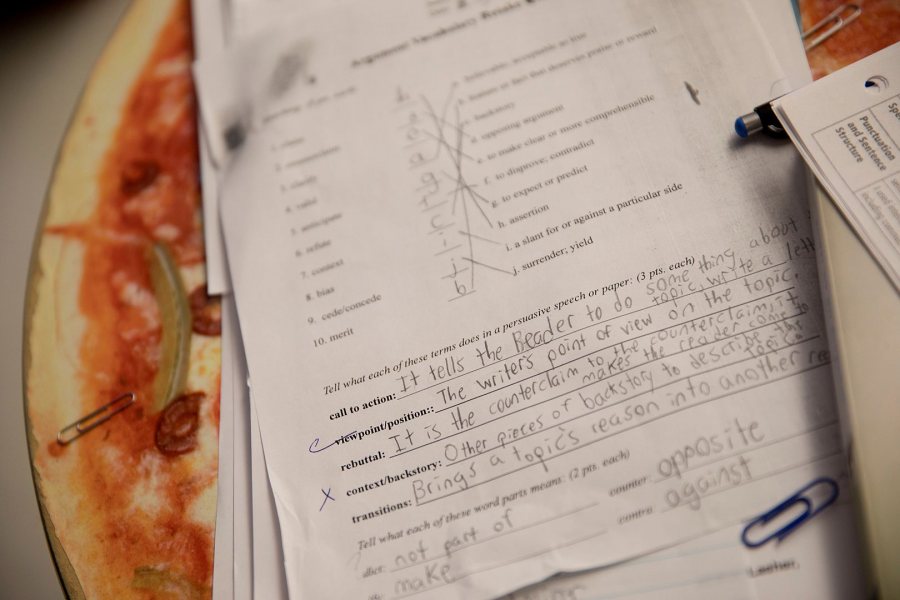If you’re feeling blue about the prospects for civic society in a post-factual era, it would ease your heart to hear Elizabeth Erbafina ’17 tell a roomful of seventh-graders about using evidence in a written argument.
“Make sure your evidence is strong, and clear, and relevant,” Erbafina says to an afternoon literacy class at Lewiston Middle School one recent Thursday. Analyze your evidence, she says, asking the students to help define that verb.
“Don’t just evidence-drop.”
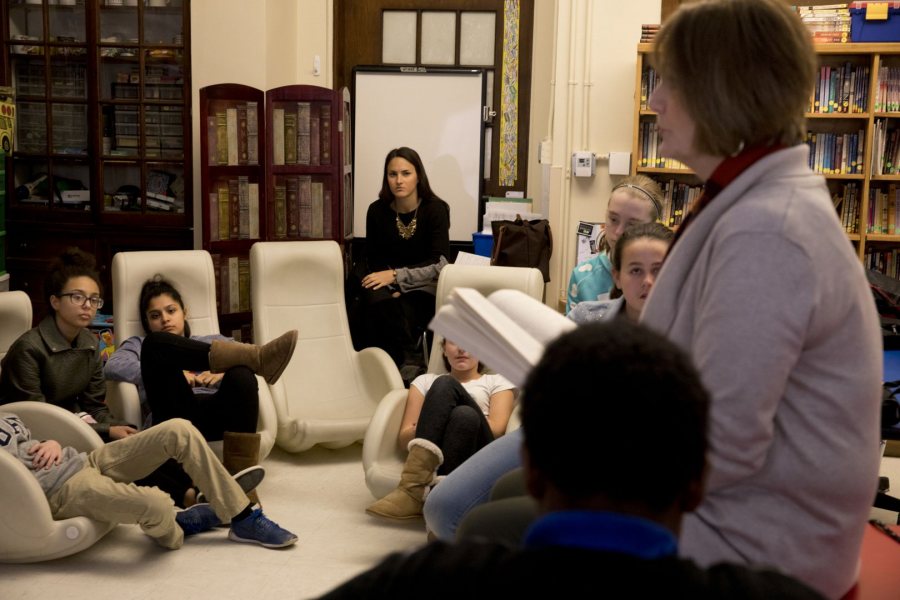
Elizabeth Erbafina ’17, center, listens as Sue Weber ’74 reads to a seventh-grade literacy class at Lewiston Middle School on March 2. Erbafina is student-teaching with Weber. (Phyllis Graber Jensen/Bates College)
The 20 students in this book-filled classroom are writing essays that argue the pros and cons of topics close to them — competitive sports, homework, climate change. Erbafina is leading the class as a student teacher under the guidance of Susan Bowditch Weber ’74, who teaches literacy at LMS.
This is career preparation for Erbafina, an English major from Sudbury, Mass. Drawn by the quality of the college’s education program, she came to Bates to learn to teach.
En route to fulfilling her education minor requirements, Erbafina last fall spent 60 to 90 minutes a day with Weber. This semester she’s been with Weber bell-to-bell, often running the class — while still taking four Bates courses.
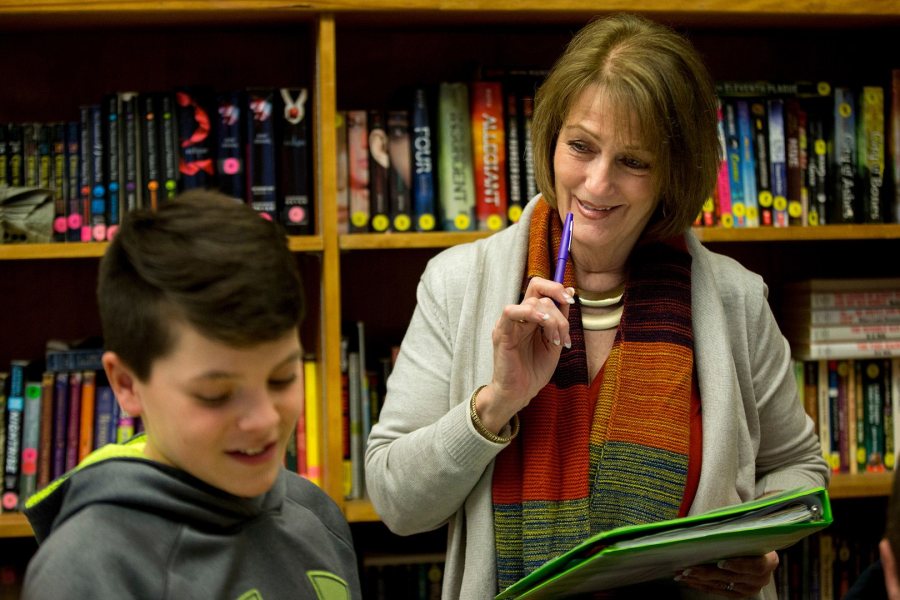
Sue Weber ’74 has taught literacy at Lewiston Middle School for 18 years. (Phyllis Graber Jensen/Bates College)
“It’s not often that I can just give my class over to the student teacher and know it’s just going to be fine,” Weber says. “It’s just like being with another adult teacher. Elizabeth’s doing a great job.”
Weber, who reckons that she has mentored a half-dozen or more student teachers from Bates, describes Erbafina as a standout — and not only because she’s really good at the work. The two have a lot in common. They’re both funny, they’re both highly organized, they both love teaching and love the kids.
And, says Weber, “she loves English, and I love English” (even though Weber majored in psych at Bates).
Erbafina first met Weber as a sophomore, observing the veteran teacher during a field experience for an education course. “I always knew in the back of my mind that I would love to student-teach,” Erbafina says, “and I always thought that maybe I would student-teach with her.
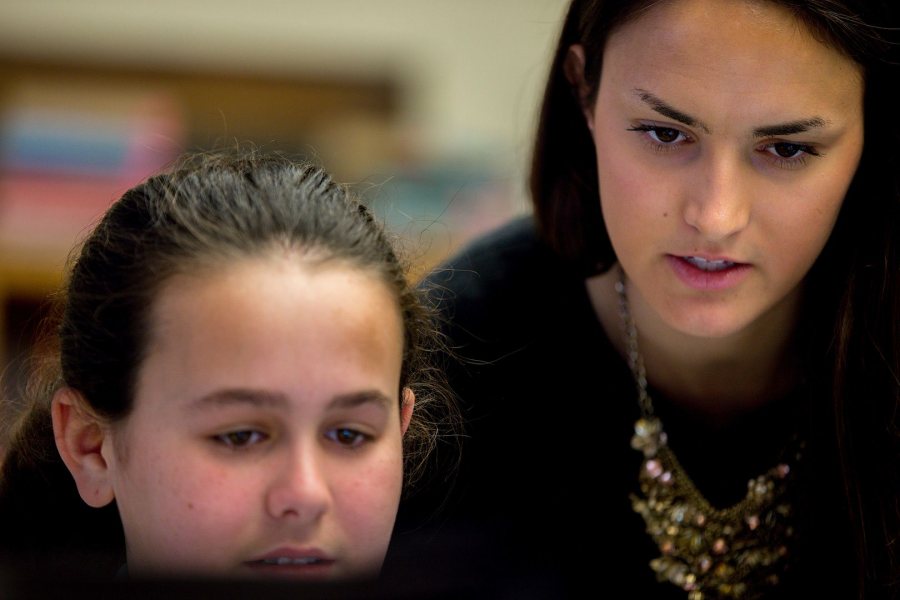
Student teacher Elizabeth Erbafina ’17 consults with a seventh-grade literacy student. (Phyllis Graber Jensen/Bates College)
“I knew Sue was a Bates graduate — we had that connection.”
An education minor at Bates can take the education studies track or, like Erbafina, the teacher-education track, which leads to a teaching certification valid in Maine and roughly 40 other states with which Maine has reciprocal certification agreements. (With placements coordinated by the college’s Harward Center for Community Partnerships, both tracks require substantial field experience.)
And though the days are past when Bates’ claim to fame was turning out “teachers and preachers,” student teaching reflects certain Bates values. The college explicitly aims to prepare its students for fulfilling and meaningful careers.
Student teaching is a great example of how that job gets done, aligning theory, practical experience, and, importantly, intentional reflection. “Our candidates face typical challenges of beginning teachers — classroom management, learning to motivate and inspire students, developing lessons and units of study, and understanding the cultural context” of the field and the students, explains Bronwyn Sale, lecturer in education.
But, she adds, “they also learn how to think about teaching.”
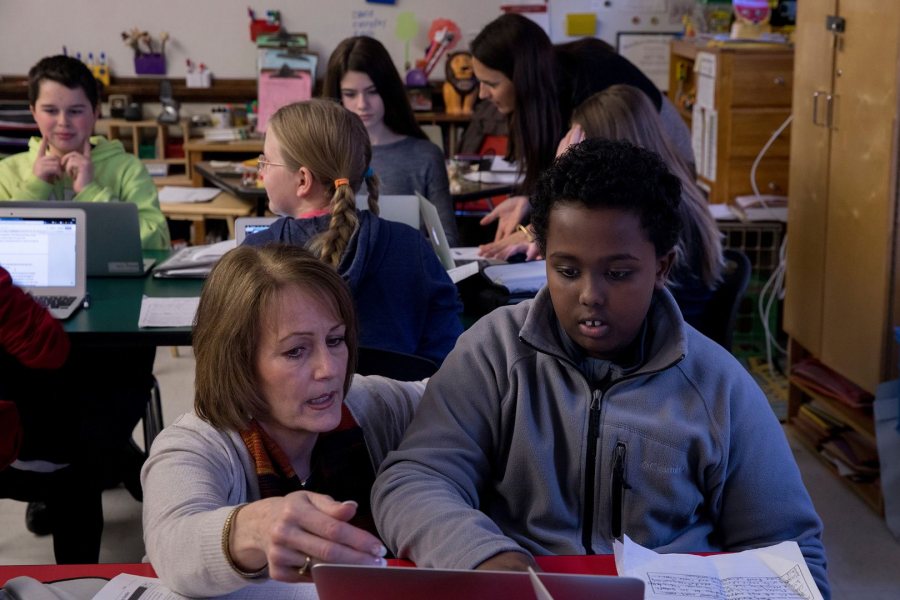
With the students’ essays due the following day, Weber and Erbafina (upper right) are ready to help. (Phyllis Graber Jensen/Bates College)
“We do so much reflection and class discussion on personal growth, which I think is one of the best aspects of the program,” says Erbafina, who cites Sale and lecturer Anita Charles as mentors in the department. “That’s a good way to balance the practical side of the classroom.”
Erbafina’s emergent philosophy of teaching is rooted in the notion that the relationship between student and teacher is reciprocal and interdependent — in fact, collaborative. While students are learning the subject at hand, they’re also showing the teacher what’s working and what isn’t.
During the Thursday class, Erbafina and Weber circulate constantly, responding to raised hands and stopping at tables to check in. Weber acts casual, but always seems to be where she’s needed. “You guys are doing fantastic,” she says. “I’ve been peeking over your shoulders.”
Erbafina, still attuning her nervous system to the countless social cues of a lively classroom, focuses like a hawk as she makes her rounds.
Educators even have a word for the awareness that new teachers need to develop. “Withitness” — sound it out, kids — is the capacity to sense what’s happening throughout the classroom at all times. Erbafina likens it to having “eyes in the back of your head.”
“It’s hard,” she says. “Sometimes you’ll be working with a student one-on-one, and in the background you see something happening — and you’ve got to sort of see what’s going on, just see if you need to intervene or not.”
“When you can teach the kids how to behave and for what reasons — for social reasons, for the emotional well-being of the class, and for their own benefit, for the learning experience — then you don’t have too much trouble with the management of your class,” Weber says.
“If you build those relationships and learn to care about each student as an individual, and get to know them, then the management falls into place. The kids care about you because they know that you care about them.”
That’s especially true for 12- and 13-year-olds. It’s an awkward age. “Elizabeth has a knack for working with them,” Weber says. “They don’t know whether they’re kids or adults — you know, they’ll do silly little things like elementary school kids, and on the other hand they’ll act like mini-adults.
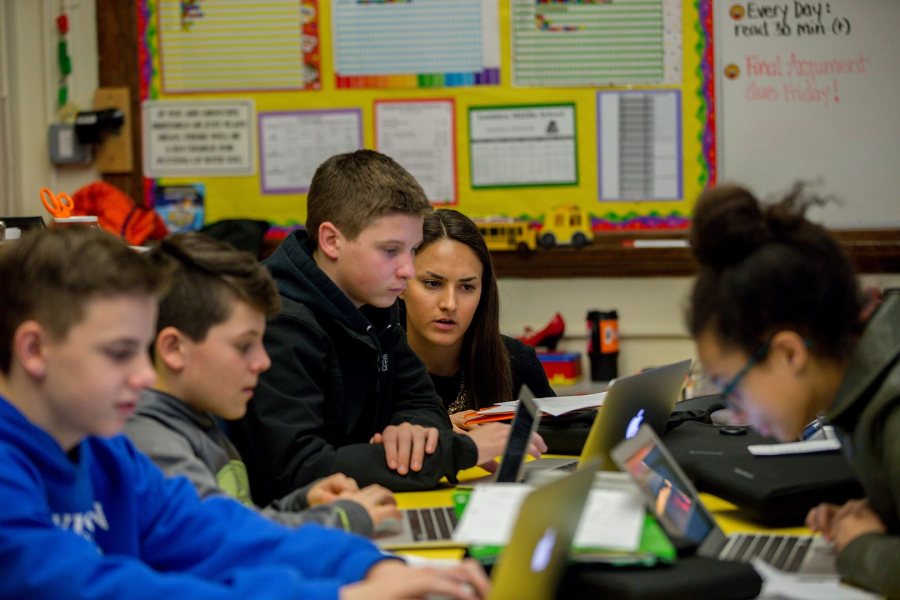
Between students and teachers and among the students themselves, the class is intensely collaborative. (Phyllis Graber Jensen/Bates College)
“So your conversations are always changing, and she’s very good at that. She gives them respect even when they’re being silly kids.”
Humor helps. “You can’t take yourself too seriously, and you can’t take the kids too seriously, but you do need to know where that line is — ‘OK, now we’ve got to work,'” Weber explains. Erbafina “has a good sense of that balance.
“Not everyone does.”
Like all Lewiston schools, LMS has a student body that’s much more diverse, in myriad dimensions, than you might expect in a small northern New England city. “It’s a great training ground for student teachers,” says Weber.
At the same time, Lewiston schools have often been ahead of the pack in adopting curricular and administrative systems that are now commonplace, such as proficiency-based learning and the Common Core learning standards initiative.
“We’re very welcoming to student teachers here,” says Weber. “We love to have them. We know they offer a whole new fresh perspective that we may not have.”
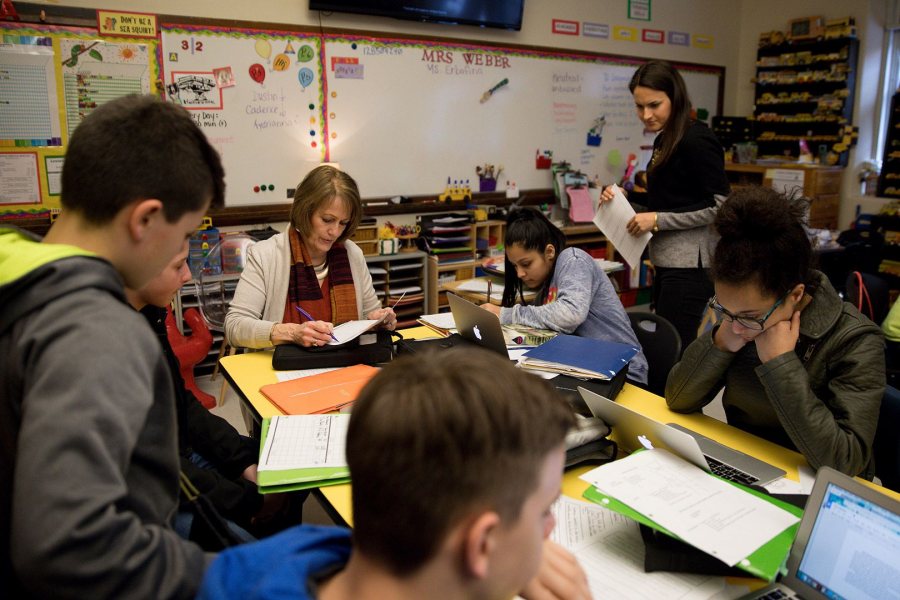
Halfway through the period, the classroom is lively but productive. (Phyllis Graber Jensen/Bates College)
She adds, “It’s a real privilege to be able to reflect on my teaching experience, sift through it, and pass on to them what I’ve found to be so important.”
“But it’s extra special in this case,” Erbafina adds, “because Sue went to Bates and I’m at Bates.”
“And Sue’s a great role model for me,” she says. “I am so lucky that she has established a great classroom culture that I can just step into.”
